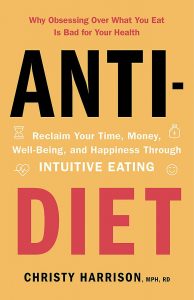Health & Fitness
Diet Culture Has Seriously Impacted Our Relationship With Food
How do we approach eating from a more holistic and healthy mindset?
by : JULIE CHAMPAGNE- Mar 1st, 2021

Trunk Archive
Draconian deprivation, obsessive thoughts, binge eating…. Nutritionist Christy Harrison knows the perils of dieting all too well. With her book, Anti-Diet: Reclaim Your Time, Money, Well-Being, and Happiness Through Intuitive Eating, she’s aiming to alter our relationship with food and challenge what we think we know about health and wellness.
What do you mean by “diet culture”?
“Diet culture is a belief system that labels certain bodies as better than others, demonizes or praises certain foods and urges people to modify themselves in order to meet established standards. It’s everywhere: There are pharmaceutical companies that make diet pills, food programs like Weight Watchers and Jenny Craig, frozen meals with ridiculous portions, juice ‘cures,’ boxed meals delivered to your home and bariatric-surgery centres. Wellness is a multi-billion-dollar industry that capitalizes on our desire to be slim and look good. To free yourself from this system, you must first understand it. That’s the main mission of my book.”
What was your inspiration for the book?
“Everything stems from my own experiences. I was fortunate enough to grow up without anyone interfering in my relationship with food—I ate intuitively. Then, in my 20s, I gained weight after switching birth-control pills. Suddenly, all of the typical diet-culture messages came back to me. I started watching my diet—tracking calories, carbs, gluten and processed foods. I became obsessed and developed an eating disorder, even though I was a journalist who covered this area. Eventually, I went back to school and got my master’s degree in nutrition.”
How did you get out of that spiral?
“It’s been a long process. I got into therapy, read about ineffective diets and took small steps toward recovery. My turning point was [reading] Intuitive Eating by Evelyn Tribole and Elyse Resch. That book confirmed to me that the key is having a peaceful relationship with food, regardless of your weight.”
Is everyone affected by diet culture?
“Women are the primary target—they are under constant pressure. Maybe Anti-Diet will appeal to them in particular, but I believe that men and trans and non-binary people will be interested in it as well. It was important for me to be as inclusive as possible while writing this book. Food, health and self-accept-ance are universal issues that affect all bodies.”
During the years you spent researching your book, did you discover anything that was especially unexpected?
“A surprising thing is that diet culture tries to convince us that diet and exercise determine 100 percent of our health. In fact, less than a third of population health is attributable to our individual behaviours. Other than genetics, everything else is determined by social factors: Environmental factors, economic status and exposure to discrimination and poverty have a much greater impact on our health and well-being. Health is so much more complex than what we eat and how we move our bodies.”
How can we improve our relationship with food?
“The first step toward intuitive eating is to deprogram yourself: Understand the history of diet culture and how it works. Then you’ll be able to better understand how it influences your beliefs, decisions and emotions. It can take years. But it’s an important starting point in regaining a natural rhythm and trusting your body—learning its signals for hunger and cravings and how to sate it.
“Diet culture conveys prejudices about gender, race and social class. It occupies our minds. It takes our money and our power to act. Intuitive eating, on the other hand, comes through self-acceptance. It encourages us to take care of ourselves—to maintain real physical and mental health. Only then can we invest time and energy in the things that really matter.”
Anti-Diet by Christy Harrison is available online and in bookstores now.

Read more:
Is the Wellness Industry Too White?
Gwyneth Paltrow’s Goop Launches Its First-Ever Vibrator on Valentine’s Day
Sexual Pleasure Has Never Been so Accessible, Stylish, and, Most of All, Normal
Newsletter
Join our mailing list for the latest and biggest in fashion trends, beauty, culture and celebrity.
Read Next

Fashion
This Canadian Swimwear Brand Designed Canada’s 2024 Women’s Olympic Beach Volleyball Team Uniforms
And they're *so* good.
by : Allie Turner- Apr 24th, 2024
Fashion
The Most Iconic Looks In Met Gala History, From 1973 To Now
40 years of the night that's all about trailblazing fashion.
by : ELLE Australia- Apr 24th, 2024

Culture
This University Elevates Women to New Professional Heights
You shouldn’t have to pause your life to move forward in your career.
by : ELLE Canada- Apr 16th, 2024




